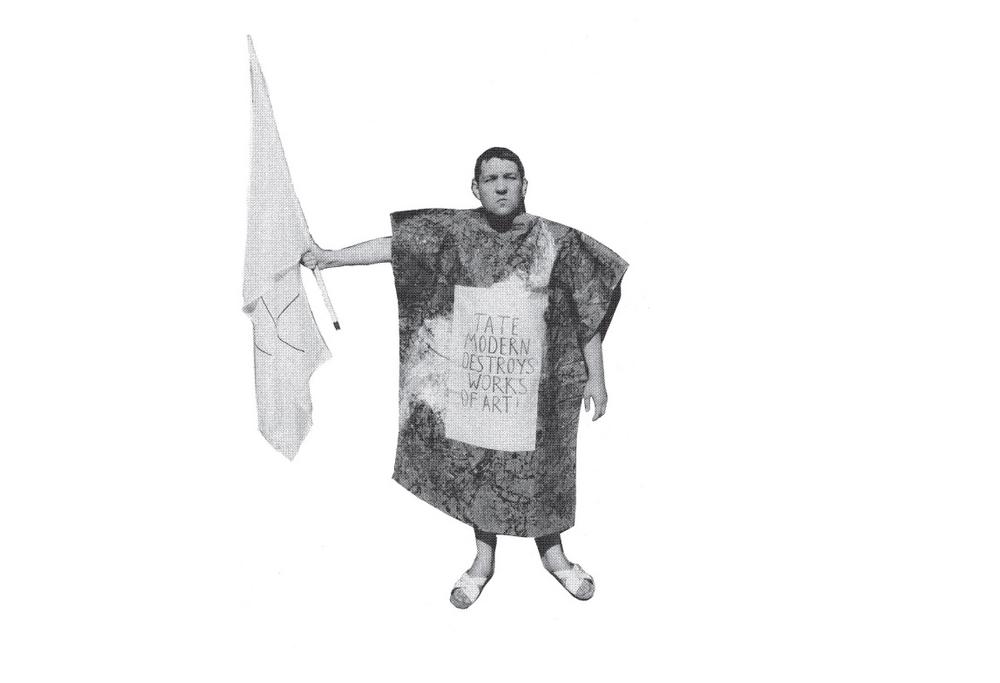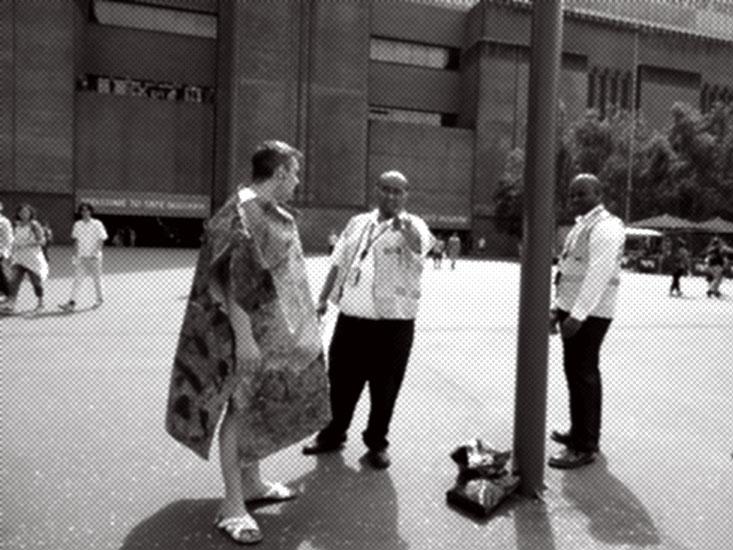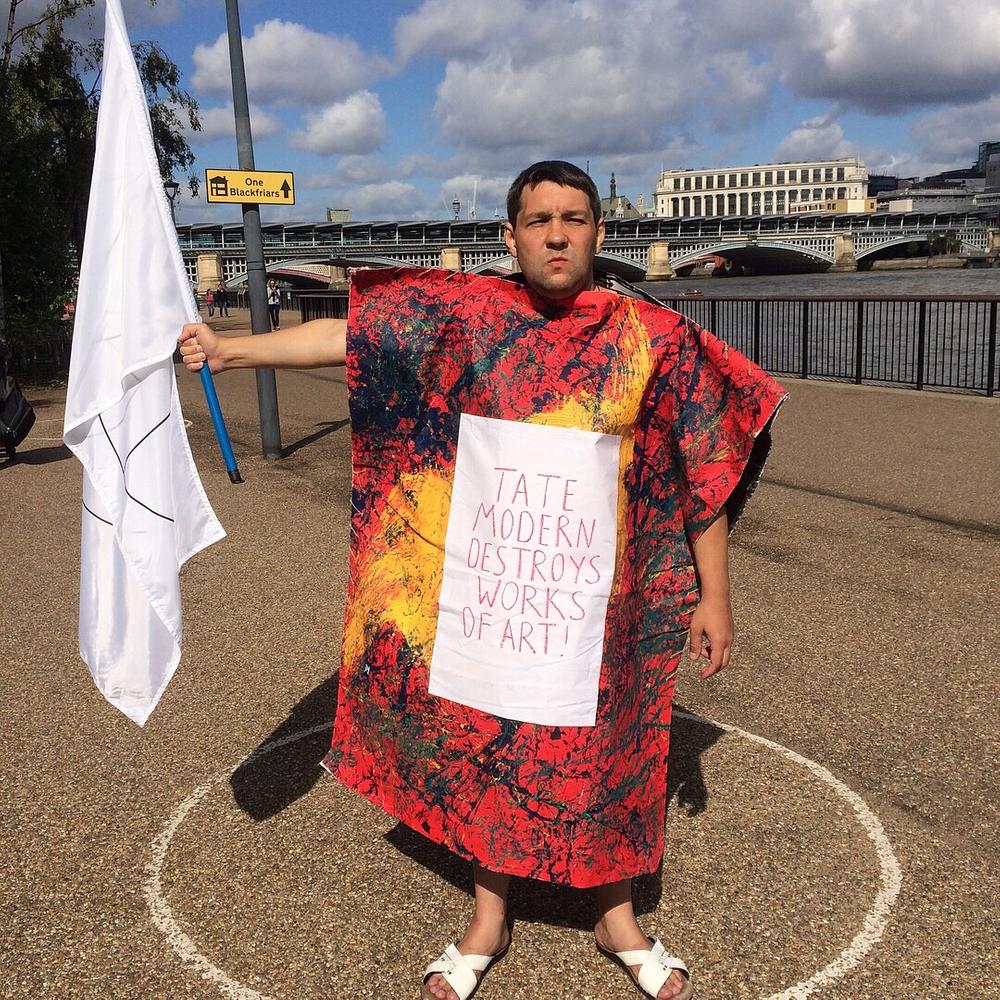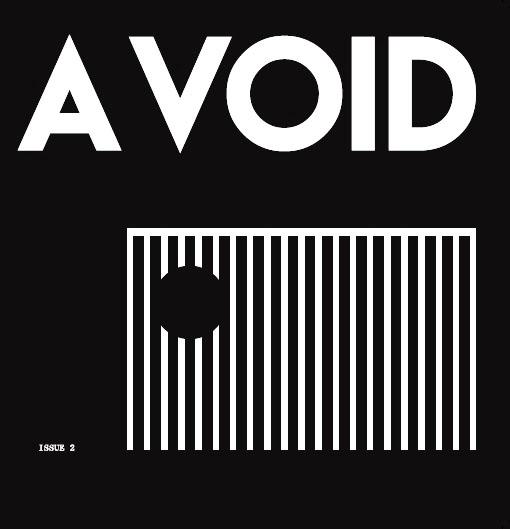January 04, 2021
THE TATE MODERN BOMBER
Alexander Art interviewed by A Void magazine with court reports and police transcripts
In the summer of 2017, I saw the Russian artist Alexander Art standing in the performance circle outside Tate Modern wearing a sign that read “Tate Modern destroys works of art!” He was getting a bollocking from a Southwark council warden as the gallery’s security looked on. The warden said the artist, who doesn’t speak English, didn’t belong there because he was not making art. Alexander refused to move, and I would see him most days on the way to my poetry stall, standing in front of the gallery iron-faced as tourists snapped photos.
A few weeks later, after reading his online manifestoes in support of his “metaperformance” outside the Tate called “Tatecide,” I met with Alexander and his wife Oksana in the atrium of the Royal Festival Hall and conducted an interview. An extremely serious man with a yellow-grey complexion, who in his rollneck looked like he belonged on a Soviet submarine, Alexander spoke forcefully against corporatized art institutions and in favour of his own movement, “Abstract Idealism.” He had come all the way to the UK on a tourist visa for six months to try and improve the Tate by opening it up to independent artists.
At the time, neither of us were aware that a month later I would receive an email from Oksana, back in Russia with her visa expired, informing me that Alexander had been arrested in London for arson, accused of throwing Molotov cocktails at the Tate in the middle of he night.
I remained in contact with Oksana and spent weeks helping to locate her husband in the black hole of the British gulag archipelago. I eventually tracked him down to Thameside prison, where he had been on hunger strike for twenty days to obtain a phone call. When he refused to eat, he says the guards threw food in his face and subjected him to days of sleep deprivation.
What follows is our first interview, followed by the verbatim police transcript of his interrogation, both conducted through translators. I have also included a short report of his court appearance and commentary from British art provocateurs David and Stuart Wise of King Mob and the Situationist International.
LEV PARKER Alexander, why come to London?
ALEXANDER ART Good question. In Russia, there are modern artists, but there is no modern art. It may sound strange, but there are modern poets, and you are a modern poet, but there is no modern poetry. So in Russia, there is no modern art; the Minister of Culture shut down all the different modern art movements. In England, you have got some shoots of growth, some shimmers of light, that remain. It’s not progressive, it’s not monumental, but you have something.
LP Were you successful in Russia?
AA In Russia I had four personal exhibitions and was part of two collective exhibitions. Only in Moscow. Some of my paintings were sold, and my business helped me earn the money. Business is separate. Essentially, there was no market in Russia, and given the most recent events, everything got stopped.
LP What gives you the right to criticise British art?
AA In the same way, in Fascist Germany, they told the Jews, “Who gave you the right to come over here and complain about our dear Fuhrer?”
LP What motivates you to spend so much time outside the Tate?
AA I have one motivation: to achieve the truth. The Tate is not only the best museum of modern art, but since the 2000s, it became a theme park, where the paintings of Picasso and Matisse are posters so that people can more actively visit the restaurant. It’s impossible.
Let’s start from the top floor. The tenth floor is the observation platform, the ninth is the restaurant, eighth is members only, seventh is staff, sixth is some sort of event floor, and the events are for money, and the art starts only from the fourth floor.
I offered a completely new approach to contemporary art, in abstract art. I proposed to take Turbine Hall, paint it, and make it into the largest exhibited painting on earth. I got rejected not because my art was bad, I got rejected because I do not know any curators at Tate Modern. I have all this correspondence, I can show it you if you like. But there are lots of websites where from £25,000 onwards, you can rent out Turbine Hall for an event, for a party.
So what relationship does this building have to art? It’s not a museum. It’s a space for rent.
There is not point of changing anything in Russia, because in Russia, apart from Putin, nothing else exists. I think you change something here.
LP What about the new platforms and spaces for contemporary art in Moscow?
AA You see, the new spaces for contemporary art in Moscow, even if you exhibit your work there, it’s meaningless. You can exhibit your work in a museum of modern art for ten or twenty years every day. The Russian movement, it became sort of hermetically sealed, and no one really needs it. The Russian movement became a reaction to Western examples. This group, Recycling, twenty years after the recycling of garbage was introduced, they created this new trend, and are being exhibited, but they do not create anything new. It’s the same with other Russian artists. Either they became hermetically sealed in their own thought space, which is typically Russian, or they try and imitate Western examples, so be exhibited abroad.
LP Have you ever tried protesting in Russia?
AA To protest against what? In Russia, people’s heads are filled with something else. Nothing apart from politics, apart from Putin, interests people. Art is on the periphery there. People queue up for the exhibitions of Ayvazovsky and Serov, but they don’t go further than that. They don’t understand Kandinsky or Malevich, the beginning of the 20th Century. For the people to begin to understand modern art, they have to go through all the phases from cubism to surrealism, then to understand that whole universe of performance. In the UK, more people go down that path, for them Kandinsky and Malevich are not joke things.
LP I think you are hopelessly optimistic about British culture.
AA From what I can see, there are more people here who think about how the form relates to the content.
LP From what I can see the number one motivation for not protesting in Russia is you’ll get your head kicked in.
AA No, no, I don’t have this motivation. If I get beaten up or arrested, I will achieve the result quicker. But I can get arrested or beaten up, 10, 20, 30 times, and nothing will change.
LP What do you think of artists like Pavlensky [who nailed his scrotum to the pavement] protesting in Moscow?
AA Pavlenskiy left Russia not because of his protest actions, but because of very concrete reasons. He is accused of rape and of battery. When a person uses his title of “artist” to leave Russia and avoid punishment for a crime, this is cowardice.
LP What do you think about his art?
AA For me there is contemporary art and eternity art. Protest art is essentially contemporary art that time is going to wash away. In twenty years, there will be no Putin, and they will forget who Pavlenskiy is. One has to orient themselves onto art that is eternal.
LP But isn’t your protest against the Tate contemporary?
AA My protest is a protest against the situation which emerged in contemporary art. Tate Modern is the brightest example of this situation. If one can change something at Tate Modern, one can change things around the world. If you can change the situation here, you can change anything. Nothing is scary anymore.
Oksana [Alexander’s wife]: Alexander is a person who ever since childhood said “no” to authority. He always saw everything with his own eyes.
LP Do you have any political affiliations?
AA I am not interested in politics, not at all. Democracy is the worst type of organization, but no one has invented a better one yet. I am not interested in politics, I am interested in art, so I separate the two. The things which are politically motivated or influenced in art, political art, is going to be washed away by time.
Let’s take the example of the National Portrait Gallery. When people visit, who is interested in the Lords of the 17th Century? At same time, everyone is interested in Turner, because Turner painted for eternity.
LP I don’t like political poetry, not if it’s basic and easy to understand.
AA Yes, because political poetry is a pamphlet, and this is a low form of art.
LP How much would you sell one of your paintings for?
AA Depends on the painting, and the customer! But this is all Oksana. I like to paint and Oksana deals with all of that. She is the head of the operation.
LP Is “Abstract Idealism” more of a philosophy or a style – to put it another way, would I recognise Abstract Idealism if I saw it?
AA Without doubt, it is a new movement in fine art. It reanimates abstract art, which had been dead since the 1960s. It’s a movement which is tied to literature, and a little bit to poetry, and absolutely on philosophy.
How will you know what is Abstract Idealism? It is simple. Next to the painting, there will be text, which will serve as the point of entry into the painting. If it is a giant painting, it will all be composed of text. A literary or philosophical text, or an unwritten novel, like Lem or Borges. I go further. To these novels, I paint a painting and write dialogues. I illustrate a novel that does not exist. Ultimately I am trying to maximally blur the lines between literature and art.
ALEXANDER ART POLICE TRANSCRIPT
Date: 23/11/2017
Name: Maslov, Alexander
DOB: 22/04/1979
Nationality: Russian
Offence: Arson
Victim: Tate Modern
Facts of Offence
Mr Aleksandr MASLOV was found at the Tate Modern on 23 November 2017 by police officer who had been called to the location to investigate reports of a man causing a disturbance outside the rear entrance to the building. On arrival Mr MASLOV told officers he needed to be arrested. It emerged that he had created a chalk artwork in the grounds of the Tate about five months earlier which had been removed by staff and since then he had been attending the location to protest on a number of occasions. Large, black markings were present on a wall and a temporary advertising board attached to that wall, ostensibly caused by fire. Mr MASLOV said “I did this” when asked about the markings. In interview Mr MASLOV explained he had been at the Tate since about 2am that morning. He explained that he had caused the black marks as they were a piece of art he had created that morning, entitled “Moment of Despair”. He was shown pictures of the black marks and confirmed that those were the marks he created, refusing to acknowledge them as damage but contending that it was a piece of art. He said he did not obtain consent anyone to create the piece; he considered the owner of the Tate to be the British people, though he had not sought permission from them either. He explained that he smashed bottles containing flammable liquid against the wall to create the piece, though only one of these contained petrol. He said the bottles had flaming cloths. He also said that he left two bottles containing flammable liquid (used to light wood for fires) at the location as evidence.
Defendant Interview
Date: 23/11/2017
Interviewee: Alexander Maslov
Interviewing officer: Sullivan
Location: MS room 2
POLICE: YOU HAVE BEEN ARRESTED AT 0918 HOURS TODAY 23/11/17 FOR ARSON, MAKING NO REPLY TO CAUTION – Is that correct? It has been alleged that whilst at THE TATE MODERN, 53 BANKSIDE SE1 9TG during the night of 22nd to the 23rd of NOVEMBER 2017 you have caused damage to the wall of the building in the form of scorch or burn marks. Would you like to tell me in your own words what happened yesterday?
ALEXANDER ART At 3am I painted a picture, “Moment of despair.” I didn’t have other devices, I used bottles with flammable liquid in them. I did it previously in chalk but TATE staff destroyed it.
POLICE Did you attend TATE MODERN last night?
AA YES – the area outside blowing horn for six hours.
POLICE Why did you attend the location, what were you intending to do?
AA I was planning to make picture, I did this.
POLICE Did you have anything with you?
AA Devices for making picture.
POLICE What was it?
AA Bottles with liquid, cloth and a bit of petrol, several of them.
POLICE Why did you have it?
AA I threw them, not to break them.
POLICE Two glass whiskey bottles were found near to where you were arrested, these bottles smell as though they contain a fuel, and are filled with a clear liquid. (SHOWING EXHIBIT DRC/4) Are these bottles yours?
AA My bottles.
POLICE What is in them?
AA Flammable liquid.
POLICE What are they for? How long were you there?
AA 2am until arrest, blowing my horn.
POLICE Who were you with?
AA Alone.
POLICE Have you been there before?
AA 5 months – not every day in the quiet performance circle
POLICE [SHOW PICTURES OF DAMAGE] Did those pictures show “Moment off despair”?
AA Parts of it.
POLICE Did you damage the walls of TATE MODERN? When officers arrived at TATE MODERN and spoke with you they were recording on their body worn cameras, I have viewed this footage which is exhibit DRC/6 and in it you say (whilst pointing to scorch marks on the brickwork of the wall of the building and a broken glass bottle) “This is my bottle, molotov cocktail” WHAT DID YOU MEAN BY THAT? WHY DID YOU SAY THAT? How did you cause that damage? Did you think your actions were likely to cause damage to TATE MODERN property?
AA No - I didn’t cause damage.
POLICE Did TATE MODERN give you permission to cause that damage?
[No clear answer]
POLICE Had you consumed any alcohol?
AA No
POLICE Had you taken any drugs?
AA No
POLICE Were you under duress or pressure by anybody to cause that damage?
AA No
POLICE Did you believe you had a right to set fire to TATE MODERN property?
AA Yes and I still do.
JUDGEMENT I
As the only journalist following the case, I spent days first trying to locate Alexander in the prison system, and then waiting around in courts with his barrister as Serco's privatized gulag repeatedly failed to produce the defendant, either in person or via video link, meaning Alexander spent Christmas lingering behind bars, unable to obtain a phone call with his wife or even his solicitor.
Then finally, Alexander Art appeared in the dock at Inner London Crown Court on 5 January 2018 looking agitated and bewildered. Initially insistent that he would plead not guilty in the hope that he would have a chance to give a speech to the courtroom and the media, his barrister informed him that such an opportunity would unlikely be afforded, as he did not have any legal defence for petrol-bombing Tate Modern.
So Alexander Art pleaded guilty through an interpreter and received a four-month suspended sentence, returning to Russia via an immigration detention centre, presumably banned from ever coming over here and trying to improve our art.
When viewed as an entire performance, Alexander Art’s “Moment of Despair” has raised important questions about the UK’s biggest art institution, our criminal justice system, and their startling similarity to their Russian equivalents.
JUDGEMENT II by David and Stuart Wise – King Mob/Situationist International
“We fully support the explosive, courageous direct action of Alexander Art in drastically exposing the utter bankruptcy of what still passes for modern art in Tate Modern’s kleptocratic citadel. What this guy has done – this latter-day heir to the best moments of Russian nihilism, from Psarev and Chernyshevsky in the latter half of the 19th Century through to Malevich in the first two and a half decades of the 20th Century – really does mean something. But what, precisely?
“It points to a lacunae worldwide – not just in Russia – that the revolution of modern art has not been up with the modern art of revolution. Instead, post- the liberating creative uprisings of the late 1960s and early 1970s, an extensive decrepit period of social glaciations, underpinned by the rise of neoliberal capitalism, has destroyed all hope of authentic life.
“Fiat money and the dregs of modern art are now inseparable. In comparison, Alexander Art’s direct action is the only creative act Tate Modern has ever hosted, albeit unwittingly, though for certain the museum’s biggest ever hit!"
— Words and images by Lev Parker, with thanks to Oksana and Ekaterina for translations
ALEXANDER ART'S MANIFESTOES AND ARTWORKS CAN BE FOUND AT ALEXANDER-ART.BIZ
TATE MODERN BOMBER first appeared in A Void issue 2, New Irrational Perspectives, in 2018, now sold out. Free PDF download in our shop
To receive our annual Surrealist journal as soon as it comes off the press, join our mailing list at PATREON.COM/MORBIDBOOKS
Also available from select retailers including Tate Modern...



